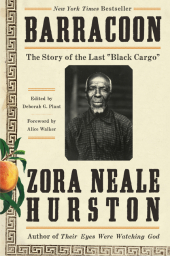 Neuerscheinungen 2019Stand: 2020-02-01 |
Schnellsuche
ISBN/Stichwort/Autor
|
Herderstra▀e 10
10625 Berlin
Tel.: 030 315 714 16
Fax 030 315 714 14
info@buchspektrum.de |

Zora Neale Hurston
Barracoon
The Story of the Last "Black Cargo"
2019. 224 S.
Verlag/Jahr: HARPERCOLLINS US; AMISTAD 2019
ISBN: 0-06-274821-1 (0062748211)
Neue ISBN: 978-0-06-274821-8 (9780062748218)
Preis und Lieferzeit: Bitte klicken
Now in paperback: A major literary event: a never-before-published work from the author of the American classic Their Eyes Were Watching God that brilliantly illuminates the horror and injustices of slavery as it tells the true story of one of the last known survivors of the Atlantic slave trade - abducted from Africa on the last "Black Cargo" ship to arrive in the United States.
This newly published work covers the life of Kossola, also known as Cudjo Lewis, who in 1927 was one of the last living survivors of the Atlantic slave trade. Barracoon is phenomenal because Cudjo┤s story begins when he is free and a young man living in Africa. It describes the circumstances of his capture by Dahomian warriors, and his detention in a barracoon while awaiting his trade to slavers. It describes how he was smuggled out of Africa onto the last "Black Cargo" ship, the Clotilda, and tells of his journey through the Middle Passage, to his arrival in the United States on the Alabama River near Mobile, Alabama. The narrative also recounts Kossola┤s five and half years of enslavement, his freedom, and his role in the founding of Africatown, the first town established by and continuously controlled by Africans. In 1927, famed anthropologist Franz Boas and Carter G. Woodson, "the father of black history," sent writer Zora Neale Hurston to Plateau, Alabama, to interview eighty-six-year-old Cudjo Lewis. Of the millions of men, women, and children transported from Africa to America as "slaves," Cudjo Lewis was the only survivor of the Clotilda to tell the story of this essential part of our nation┤s history. Boas and Woodson wanted Cudjo┤s firsthand account of the raid that led to his capture and bondage, more than fifty years after the US Congress officially outlawed the Atlantic slave trade in the United States. In 1931, Hurston returned to Plateau, the African-centric community three miles from Mobile founded by Cudjo and other survivors of the Clotilda. Spending more than three months there, she conducted in-depth interviews with Cudjo about the details of his life. During those weeks, the young writer and the elder talked about Cudjo┤s memories from his enthralling childhood in Africa, the horrors of being captured and held in a barracoon for selection by American slavers, the harrowing experience of the Middle passage, packed with more than 110 other souls aboard the Clotilda, and the years he spent in slavery until the end of the Civil War. Based on those interviews that are rendered in Cudjo┤s unique vernacular, Hurston presents Cudjo┤s story with the deftness of the skilled ethnographer and the compassion and singular style that have made Zora Neale Hurston one of the most remarkable social scientists and preeminent American authors of the twentieth-century. Offering insight into the pernicious legacy that continues to haunt us all, this poignant and powerful work marks a major literary event and an invaluable contribution to our shared history and culture. Barracoon includes a Foreword from Pulitzer Prize winning author, Alice Walker and an Introduction from Zora Neale Hurston scholar and literary critic Deborah G. Plant. Hurston┤s initial interview with Cudjo was eventually published in the Journal of Negro History by Dr. Carter G. Woodson. The interview drew controversy from modern scholars because of background information Hurston used from another source. Barracoon goes far beyond that initial piece; Hurston spent months with Cudjo to elicit further detailed memories from the former slave - knowledge that informs this astonishing work.


